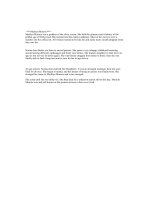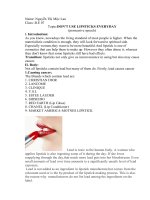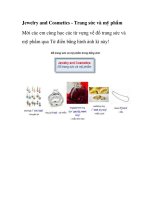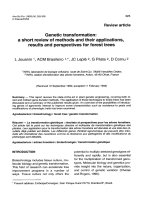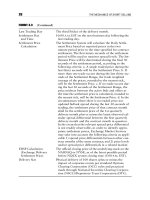Short essay Womens fashion and cosmetics
Bạn đang xem bản rút gọn của tài liệu. Xem và tải ngay bản đầy đủ của tài liệu tại đây (52.66 KB, 2 trang )
Women's Fashion And Cosmetics
The fashion industry makes up a large part of our economy. Ten
billion dollars a year is spent on cosmetics and skin-care products
alone. Some may think that these fashions and products help raise
the self-esteem of women and make them more successful. However,
success is not based on appearance. We are judged by our hard work
and achievements. Women's fashion and cosmetics serve to imprison
women rather than liberate them. Make-up is money and time
consuming, billboard images send out false portraits and high-fashion
footwear is costly health wise and economically.
A considerable amount of time is spent on make-up and styling hair.
It takes at least fifteen minutes to put on the make-up in the
morning and it takes ten minutes to take it off at night and if the
make-up isn't removed, it will clog pores and cause acne. This time
could be used more productively by perhaps eating a healthier
breakfast, exercising or getting to school earlier to prepare for
classes. Liane Faulder of the Edmonton Journal says, "Part of the
problem with worrying about how you look is that it drains you of
time, money and energy which you could use for other things. Like
pursing a career, reproductive rights, or equal pay for work of equal
value. Or maybe just having fun." It is also money consuming. Make-
up and hair products are expensive. The money used to buy cosmetics
and hair styling products could be spent for more important things.
If one has that much money to give away, why not save it for a
college education or donate it to a charitable organization? The
time and money spent on cosmetics and hair commodities imprisons
women by preventing them from doing more constructive things.
Next, billboard images of waif models cause thousands of women to
diet to the point of anorexia. People see beautiful models on T.V.,
magazines and newspapers. These gorgeous models have big breasts,
small waists, long legs and lashes. Women think that this is the
image of the "perfect woman" when really she weighs almost 23% less
than the average American woman. As a result, each year 150 000
American women die of anorexia. Because of these false images of
ravishing models, women are prisoners of hunger.
Finally, high heels are a major cause of foot problems among women.
Many women place their rectangular feet into triangular-shaped high-
fashion footwear which can lead to twisted ankles, osteoporosis and
limited mobility. Wearing high heels also causes bunions,
bunionettes, hammertoes, and neuromas. Consider that of 813 bunion
operations, 94% were done on women. Of 111 bunionettes, 87% were on
women. Of 848 hammertoes corrections, 70% were carried out on women.
And of 299 neuromas, 88% were on women. High heels cause a downward
pressure forcing the wide foot further into an already narrow toe
space, whereas, men's shoes generally fit the dimensions of the foot.
Women are ruining their feet by wearing shoes that are two sizes too
narrow. Let's also consider the cost of "tightness" when both Canada
and the U.S. are facing staggering health bills. It is estimated
that 850 000 foot operations cost the U.S. $3.5 billion dollars.
Vanity should not take priority over health and health costs. women
are limited in high heels because of their lack of mobility and high
health risks.
Women's fashion and cosmetics serve to confine women by wasting time,
money and energy. It may also involve health risks. A money
draining industry dominates women in this society. Women need to
judge and determine whether or not they want to be ruled by it.
People might argue that looking good and the attention that comes
with it raises self-confidence and self-esteem. But, has society
come to the point that we have to resort to superficial products and
material things to make us feel capable? We should feel good about
the things that we work hard to achieve not the things we put on.



